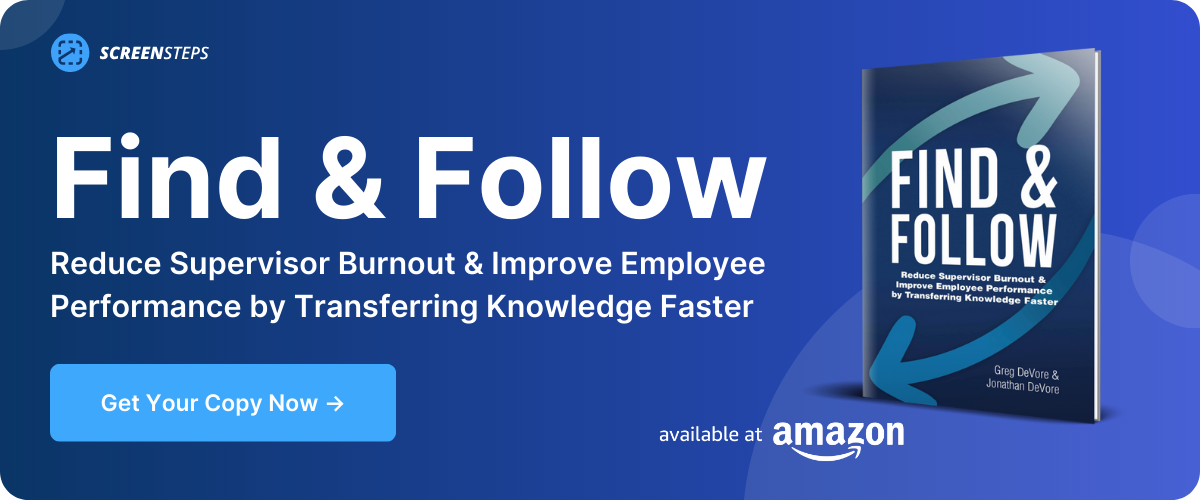What Does a Knowledge Ops Manager Do? (Role + Job Description)
When it comes to the person in charge of managing your company's knowledge, I prefer the role of Knowledge Operations Manager to that of Technical Writer.
Both roles create documentation. But, while Technical Writers focus on formatting and output, Knowledge Ops Managers focus on empowerment, performance, and outcomes.
Technical Writers write documentation. Knowledge Ops Managers create knowledge experiences that enable employees to succeed with less effort and less stress.
Technical Writers are usually a required cost while Knowledge Ops Managers save organizations thousands and sometimes millions of dollars.
A Technical Writer shows you what they wrote. A Knowledge Ops Manager shows you what they helped someone do.
A Knowledge Operations Manager can add so much value to an organization. That is why we recommend our customers create this role when using ScreenSteps, our knowledge base software.
So, what do Knowledge Operations Managers actually do? What skills do they need to have?
In this post, I’ll share a job description that provides a good overview of the responsibilities and skills your Knowledge Ops Manager will need. Then I'll provide a more in-depth look at some of those responsibilities to help you select the best Knowledge Ops Manager for your company.
Job description
This job description provides a good overview of the responsibilities and skills required of your Knowledge Ops Manager.
Feel free to copy and paste this job description to your job posting for a Knowledge Ops Manager.
Responsibilities
- Run Find & Follow Planning Workshops to ensure the organization has a complete understanding of the responsibilities of each role
- Connect and align your training and operations teams
- Oversee/manage the creation and continued health of your knowledge base and digital guides
- Create or guide others to create digital guides that meet the needs identified in the Find & Follow Planning Workshops
- Work with SMEs (subject matter experts) and other content authors to clarify and optimize their guides
- Perform Acceptance Testing on digital guides
- Monitor comments and new article requests to update and create new content
- Ensure that content is regularly reviewed and updated as needed
- Monitor search analytics to identify content gaps
- Provide knowledge base usage statistics to supervisors and directors
- Train supervisors on how to best support employees by having employees use your digital guides instead of resorting to tribal knowledge
- Ensure that digital guides are incorporated into new hire training (optionally using the Find & Follow Training Framework)
- Guide your company to climb the Knowledge Ops Maturity Model
Skills
- Ability to write clearly and concisely
- Ability to interview others to discover role requirements
- Highly organized
- Comfortable with technology
- A strong desire to empower employees to be able to work independently
The role: 7 key responsibilities
Now, let's take a closer look at some of the key responsibilities of a Knowledge Ops Manager. The Knowledge Ops Manager owns these tasks, meaning they take responsibility for making sure they are handled.
1. Run Find & Follow Planning Workshops
Before launching a new knowledge base, your company needs to hold a Find & Follow Planning Workshop. The Workshop helps you align your teams and identify different tasks your end-users need to handle according to the role they are in.
Your Knowledge Ops Manager leads this meeting. They are in charge of making sure your discussions stay on track and that you don't leave any leaf unturned.
The Knowledge Ops Manager ensures that when the meeting is finished you walk away with a clear and comprehensive list of content you need to create.
2. Oversee the overall health of your knowledge base and digital guides
The Knowledge Ops Manager "owns" the knowledge base. That means they are in charge of making sure:
- The knowledge base is organized
- It is filled with digital guides as identified in your Find & Follow Planning Workshop
- End-users can find the guides that answer their questions
- Digital guides are up-to-date with accurate information
They monitor comments on existing digital guides to answer questions and make clarifying edits to the guides. As new article requests come in, they either write the new article or assign another content author to create the guide.
Additionally, a Knowledge Ops Manager regularly certifies the accuracy of the articles. They ensure that content is up to date by scheduling routine reviews of the digital guides.
3. Create digital guides (or delegate)
While your Knowledge Ops Manager oversees what guides are created, they don't necessarily need to write the guides.
Your manager can train and assign other SMEs to create digital guides. Knowledge Ops Managers can even assign different content authors to be in charge of keeping specific articles up-to-date.
Before publishing guides, your Knowledge Ops Manager runs Performance Acceptance Testing. While a beta group of employees (or other appointed end-users) use your guides, the Knowledge Ops Manager listens and observes. They take notes and make edits to clarify the guides.
4. Update and optimize guides with end-user feedback
Your Knowledge Ops Manager listens to end-user feedback to optimize your guides. This includes incorporating and responding to comments and suggestions on your digital guides.
Optimizing your guides includes ensuring that the information is up-to-date with the most current and accurate information.
5. Track knowledge base usage analytics
It's your Knowledge Ops Manager's job to understand how your end-users are using your knowledge base.
They track and evaluate usage statistics. Then they share these reports with supervisors and directors.
By monitoring search analytics, your manager can identify content gaps. This helps you know which guides are missing from your knowledge base and what you need to create.
6. Ensure digital guides are incorporated in new hire training
Not only do you want your Knowledge Ops Manager to know how people are using your knowledge base, but you want them to encourage end-users to use your knowledge base articles to handle daily tasks.
They do this upfront by working with trainers and supervisors. Knowledge Ops Managers work with trainers to ensure that the digital guides are incorporated in new hire training.
Then they train supervisors on how to best support employees by answering questions with the digital guides and encouraging employees to self-answer questions with your knowledge base articles.
Find & Follow Training Framework
One training curriculum that incorporates digital guides is the Find & Follow Training Framework. It uses scenario-based training so new hires can practice realistic scenarios while following your guides.
7. Guide your team to climb the Knowledge Ops Maturity Model
Your Knowledge Ops Manager is there to help operations and knowledge sharing run smoother. Over time, this will result in improved employee performance, faster time to proficiency for new hires, and decreased costs.
No matter where you start on the six stages of the Knowledge Ops Maturity Model, the ultimate goal is to function at the Accelerate Stage.
Your Knowledge Ops Manager helps you make adjustments to your digital guides and training programs so that you can reach that goal.
Organize your knowledge ops with the right hire
When it comes to managing your company knowledge and creating documentation, a Knowledge Ops Manager is the position that will be most lucrative for your company.
The next challenge is choosing the right Knowledge Ops Manager to organize and lead your knowledge operations.
Need help selecting and/or training your Knowledge Ops Manager?
Our ScreenSteps experts can help train your new Knowledge Ops Manager to know how to fulfill their role and utilize knowledge ops best practices.
Schedule a meeting with a ScreenSteps rep to learn more about how to select the right Knowledge Ops Manager and what training options you have.




